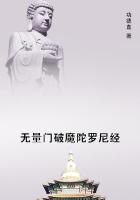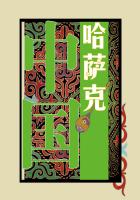Tap, tap, tap, the knuckles went rapping on the man's forehead, despite his flying arms.
"Now," said French, "hit me."
The Galician made a feeble attempt.
"Oh, don't be afraid. Hit me hard."
The Galician lunged forward, but met rigid arms.
"Come, come," said French, reaching him sharply on the cheek with his open hand, "try better than that."
Again the Galician struck heavily with his huge fists, and again French, easily parrying, tapped him once, twice, thrice, where he would, drawing tears to the man's eyes. The Galician paused with a scornful exclamation.
"He says that's nothing," interpreted Kalman. "You can't hurt a man that way."
"Can't, eh? Tell him to come on, but to look out."
Again the Galician came forward, evidently determined to land one blow at least. But French, taking the blow on his guard, replied with a heavy lefthander fair on the Galician's chest, lifted him clear off his feet and hurled him breathless against his load of hay. The man recovered himself, grinning sheepishly, nodding his head vigorously and talking rapidly.
"That is enough. He says he would like to learn how to do that.
That is better than a club," interpreted Kalman.
"Tell him that his people must learn to fight without club or knife. We won't stand that in this country. It lands them in prison or on the gallows."
Kalman translated, his own face fiery red meanwhile, and his own appearance one of humiliation. He was wondering how much of his own history this man knew.
"Good-by," said French, holding out his hand to the Galician.
The man took it and raised it to his lips.
"He says he thanks you very much, and he wishes you to forget his badness."
"All right, old man," said French cheerfully. "See you again some day."
And so they parted, Kalman carrying with him an uncomfortable sense of having been at various times in his life something of a cad, and a fear lest this painful fact should be known to his new master and friend.
"Well, youngster," said French, noticing his glum face, "you did me a good turn that time. That beggar had me foul then, sure enough, and I won't forget it."
Kalman brightened up under his words, and without further speech, each busy with himself, they sped along the trail till the day faded toward the evening.
But the Edmonton trail that day set its mark on the lives of boy and man,--a mark that was never obliterated. To Kalman the day brought a new image of manhood. Of all the men whom he knew there was none who could command his loyalty and enthral his imagination.
It is true, his father had been such a man, but now his father moved in dim shadow across the horizon of his memory. Here was a man within touch of his hand who illustrated in himself those qualities that to a boy's heart and mind combine to make a hero.
With what ease and courage and patience and perfect self-command he had handled those plunging bronchos! The same, qualities too, in a higher degree, had marked his interview with the wrathful and murderous Galician, and, in addition, all that day Kalman had been conscious of a consideration and a quickness of sympathy in his moods that revealed in this man of rugged strength and forceful courage a subtle something that marks the finer temper and nobler spirit, the temper and the spirit of the gentleman. Not that Kalman could name this thing, but to his sensitive soul it was this in the man that made appeal and that called forth his loyal homage.
To French, too, the day had brought thoughts and emotions that had not stirred within him since those days of younger manhood twenty years ago when the world was still a place of dreams and life a tourney where glory might be won. The boy's face, still with its spiritual remembrances in spite of all the sordidness of his past, the utter and obvious surrender of soul that shone from his eyes, made the man almost shudder with a new horror of the foulness that twenty years of wild license upon the plains had flung upon him.
A fierce hate of what he had become, an appalling vision of what he was expected to be, grew upon him as the day drew to a close.
Gladly would he have refused the awful charge of this young soul as yet unruined that so plainly exalted him to a place among the gods, but for a vision that he carried ever in his heart of a face sad and sweet and eloquent with trustful love.
"No, by Jove!" he said to himself between his shut teeth, "I can't funk it. I'd be a cad if I did."
And with these visions and these resolvings they, boy and man, swung off from the Edmonton trail black and well worn, and into the half-beaten track that led to Wakota, the centre of the Galician colony.















